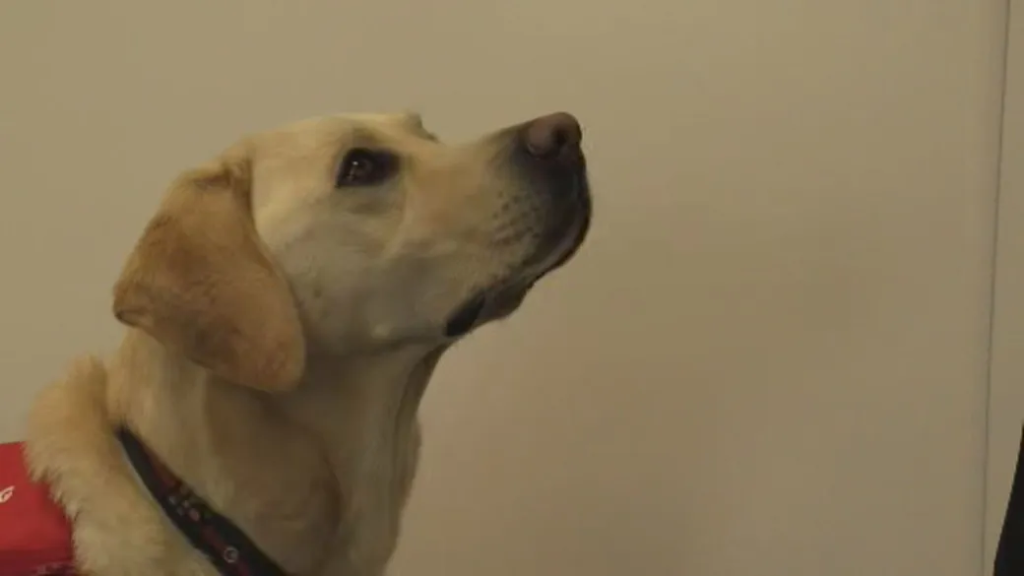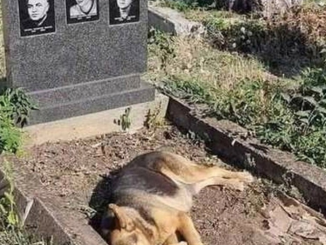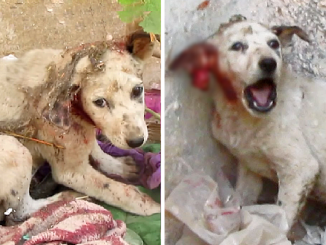
As the availability of COVID-19 tests dwindle across Canada, another option to detect the virus in the form of a furry friend may be the next best thing.
Multiple studies show that dogs can be more effective, faster and potentially less expensive than the current tests on the market.
The research has grown since 2020, with University of California Santa Barbara professor Tommy Dickey finding the collective research shows trained scent dogs are “as effective and often more effective” than both the rapid antigen tests many people keep in their homes, and even the PCR tests deployed at clinics and hospitals.
But even with studies showing their effectiveness, COVID-19-detecting dogs are deployed only in certain jurisdictions in various countries.
One such place is the Canines for Care program at Vancouver Coastal Health (VCH), which started looking into the possibility of training dogs to detect COVID-19 in early 2021.
Dr. Marthe Charles, division head of medical microbiology and infection prevention and control at VCH, said the idea stemmed from the early reliance on laboratory testing.
“I think there was a will from public health at the time and also from the various levels of government to try to find a way that was fast, accurate and non-invasive to be able to detect and train as many people as possible,” Charles told Global News in an interview.
Three dogs — two Labrador retrievers and an English springer spaniel — were brought in for training. The dogs were exposed to items such as masks that were worn by patients either negative or positive for the virus. This trained the dogs to recognize what is and is not COVID-19.

Charles said the dogs were trained since being puppies to associate the scent of COVID-19 with food and were rewarded each time they correctly detected a positive case of the virus.
“So from early on in their lives, they’ve associated the scent of a case of COVID to a rewarding scent,” she explained.
This reward method is not just used by VCM. It was also used with a group of dogs sourced in early 2021 for a French study, trained at detection using toys — usually tennis balls — as rewards.
Dr. Carla Simon, owner of Hunter’s Heart Scent Detection Canines in Calgary, said this method of training dogs is common. By using rewards, it can help motivate them to find the scent.
“We would pair, let’s say, the sweat samples with COVID, with their reward, and they notice that every time they find their reward, there’s that special smell,” she explained. “We just have to make it rewarding for the dog.”
She added, however, that the dog chooses the reward so trainers can ensure the canines “show up every day and want to do their job.”
Earlier this month, Dickey along with Heather Junqueira of BioScent, Inc. gathered several peer-reviewed studies into a review that was published in the Journal of Osteopathic Medicine. Dickey said the number of peer-reviewed studies over the past few years went from four to 29, incorporating the work of more than 400 scientists from more than 30 countries and 31,000 samples.
The review noted the effectiveness of dogs’ ability to detect COVID-19 comes down to their noses.

“The nose is not like humans,” Simon said. “It’s massively different, orders of magnitude different, and they can detect things without us being able to smell them.”
Humans have about five to six million olfactory receptors in their noses, while dogs have hundreds of millions. One-third of their brain is devoted to the interpretation of smell — something only five per cent of a human’s brain is committed to, according to Dickey’s review.
The study found dogs’ noses may even be able to detect pre-symptomatic COVID-19 cases, or even those who will develop symptoms later.
Dickey told us in an interview that this could help limit or stop the virus from spreading.
“The longer the wait is between your test and your result, that’s a latent period,” he said. “During that time you’re running around spreading COVID and you don’t know it. The dogs with a direct sniff will be done in seconds.”
Many of the studies conducted, including the work at VCH through the Canine for Care program, have shown dogs’ ability to detect the disease correctly with a success rate of more than 90 per cent. Additionally, the studies also showed a high speed at which the dogs could identify cases. In one study in Thailand, researchers reported the dogs had gone through thousands of samples in just a few weeks.
“The dogs take only one to two seconds to detect the virus per sample. Once they detect a patient, they will sit down,” said Chulalongkorn University professor Kaywalee Chatdarong, who led the 2021 project. “This takes only one to two seconds. Within one minute, they can manage to go through 60 samples.”
Even though the research suggested deploying scent-detection dogs could also be less expensive than rapid or PCR tests, Charles cautioned the logistics that go into training the dog is where it becomes “more prohibitive.”

In VCH’s case, training of the dogs included the medical microbiology lab to provide samples for use, working with infection prevention teams and control nurses, and if a dog identifies an area of concern, cleaning services may need to be utilized. And when it comes to rolling out testing using the dogs, enough staffing is needed for mass screening.
Despite this, while Charles says deploying the dogs widely could be difficult due to staffing and training, they are still one of several tools that can be used in COVID-19 detection.
“I think the way to see those dogs from my perspective is really like another tool in the toolbox and trying to prevent further transmission of pathogen of concern,” she said.
Dickey and Junqueira say dogs should have a place in “serious diagnostic methodology” including in helping should the world face a future pandemic.
51 DOGS RESCUED FROM THE DOG MEAT TRADE IN VIETNAM

Dr. Katherine Polak, Head of Stray Animal Care Southeast Asia for FOUR PAWS
The dog meat trade is big business in Vietnam and threatens the lives of millions of dogs every year, many of them pets. Every day, pets are violently snatched off the streets, from yards, and even while out on a walk with their owners. These unlucky dogs make a brutal journey to slaughterhouses, markets, and restaurants, where a gruesome death awaits them. But times are changing, and the brutality and illegality of pet theft is no longer being tolerated by Vietnamese authorities.
In a landmark case, police in Thanh Hoa Province received a tip off regarding a gang of dog thieves believed to have stolen thousands of dogs since the beginning of the year. On September 15, 2019 the police successfully carried out the largest ever bust of a dog theft ring in Vietnam, resulting in the seizure of 51 dogs. According to the police, the gang carried stun guns and other sharp weapons, and rode motorbikes through residential areas late at night shooting dogs roaming outside. Police arrested a total of 16 suspected gang members and questioned more than 40 suspects. The gang not only brutalized neighborhood dogs, but also caused outrage among local people, particularly pet owners.
Following the interception, Police struggled to properly care for the confiscated dogs given their limited capacity for animal care, so the Asia Canine Protection Alliance (ACPA), of which FOUR PAWS is a member, stepped in to offer assistance. There were 13 dogs in need of immediate medical care due to severe wounds sustained during capture. Dogs with painful open wounds were anaesthetised, treated, provided pain medication and antibiotics, and housed in a temporary shelter for ongoing treatment.
The Asia Canine Protection Alliance is an international alliance of four animal protection organizations committed to ending the illegal trade of dogs in Vietnam: FOUR PAWS, Animals Asia, Humane Society International, and Change for Animals Foundation. ACPA is working to build collaborative relationships with the governments throughout Southeast Asia where the dog meat trade is prevalent, and has already secured a moratorium on the trade in dogs between Thailand and Vietnam.
Following the confiscation, the police publicised the bust throughout the province using local media so that stolen dogs could be reunited with their families.
Over the course of 2 weeks, all 51 dogs were successful reunited with their owners, who were devastated by their pets’ disappearance.
This bust pets a major precedent as dog theft is rarely treated as a criminal offense in Vietnam unless the canines are valued at more than VND2 million ($86).
“These arrests will hopefully go a long way in deterring future dog theft in Thanh Hoa Province, and potentially throughout all of Vietnam. While the dog meat trade is often defended as ‘culture’ or ‘tradition’, the reality is that there are significant health and societal impacts associated with the trade and these are becoming of ever-growing concern within Vietnam and internationally.”

Earlier in the week, the Food Safety Management Board of Ho Chi Minh City urged locals to stop eating dog meat in an effort to improve Vietnam’s national image with tourists. They also warned the local community of the health risks posed by consuming the unregulated meat. This followed a similar call by the Hanoi People’s Committee last year.
In addition to membership in ACPA, FOUR PAWS also runs a ‘Cats Matter Too program‘ in Central Vietnam with local charities PAWS for Compassion and Vietnam Cat Welfare to improve veterinary training, animal welfare education, and provide free spay/neuter services.



Leave a Reply